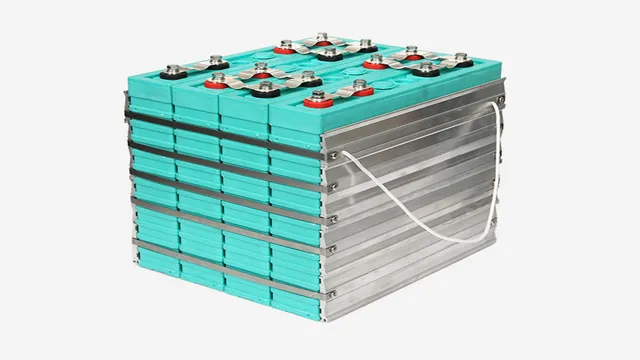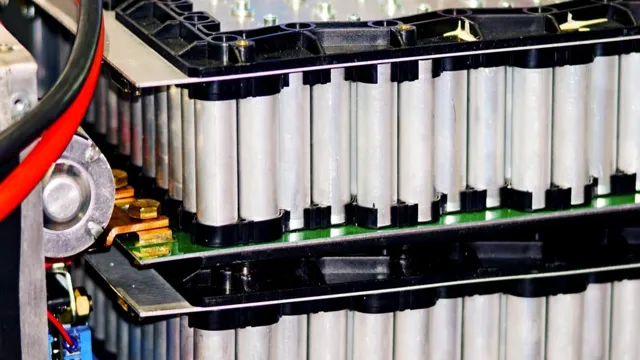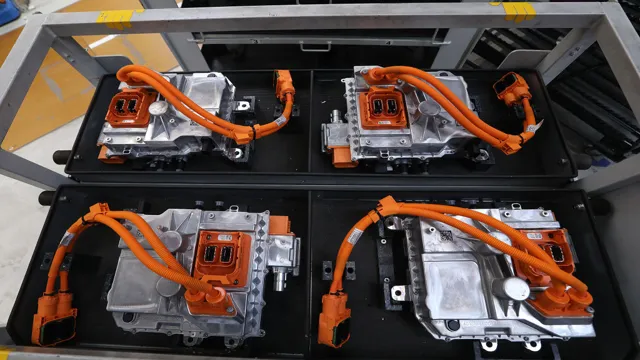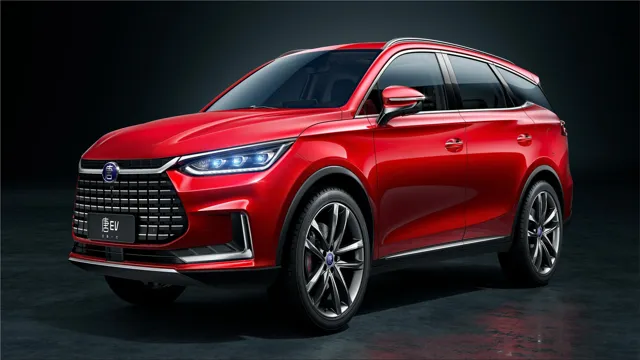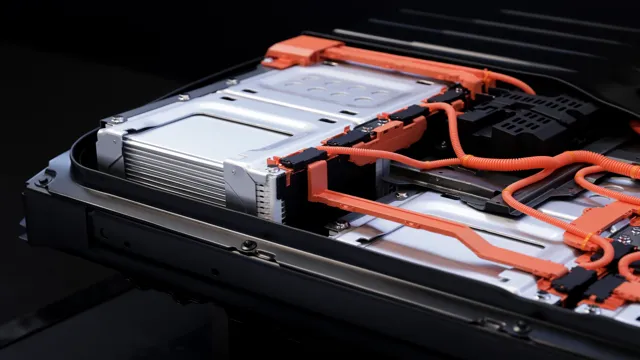Power Up Your Electric Car Conversion with the Best Batteries: Top Picks and Reviews for Maximum Performance
Are you thinking about converting your petrol-powered car to electric? If yes, then it’s crucial to have the right battery for your conversion. The battery is the heart of your electric car, and choosing the right one can make or break your conversion. With so many options available, finding the best battery for your electric car conversion can be overwhelming.
But don’t worry, we’ve got you covered. In this blog, we’ll be discussing the best batteries for electric car conversion. From lead-acid to lithium-ion, we’ll break down the pros and cons of each battery type.
We’ll also delve into the factors that you should consider when choosing a battery for your electric car conversion. Converting your petrol-powered car to electric is an exciting project, and it allows you to reduce your carbon footprint. However, choosing the right battery for your conversion is critical as it can impact your car’s performance, range, and overall cost.
So, let’s dive in and find the best battery for your electric car conversion.
1. Lithium-Ion Batteries
When it comes to converting your car to electric power, choosing the right battery is crucial. Lithium-ion batteries are often considered the best option for electric car conversions due to their excellent energy density, long lifespan, and high performance. They are also relatively lightweight and compact, making them an excellent choice for vehicles where space is at a premium.
Lithium-ion batteries do require careful handling and management, however, as they can be prone to overheating if not properly charged and maintained. If you’re considering converting your car to electric power, investing in a high-quality lithium-ion battery pack is definitely the way to go. With the right battery, you can enjoy years of reliable, efficient performance, and make the switch to electric driving with confidence.
High energy density and efficiency
When it comes to high energy density and efficiency, Lithium-ion batteries come to mind. These batteries have been revolutionary in modern technology and have been used in our everyday objects like smartphones, laptops, electric cars and more. Due to its high energy density, this battery has a high capacity to store more energy in smaller spaces, giving users more power for longer periods.
Lithium-ion batteries have also been known for their efficiency as they convert stored chemical energy into electricity with minimal loss and reduced heat generation. They are more reliable than other battery types and can pack a significant amount of power in their small size. With these features, Lithium-ion batteries remain one of the top choices for power systems in both primary and secondary applications.
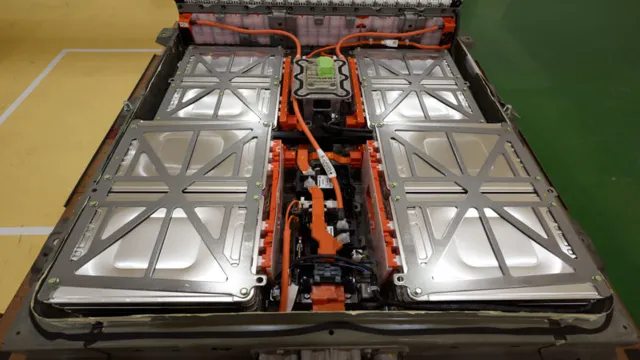
Expensive but offer longer range
Lithium-Ion Batteries are a popular choice for those who want a longer range when it comes to their electric vehicles. Although these batteries may come with a heftier price tag, they offer a more extended lifespan, making them a worthwhile investment in the long run. Lithium-Ion batteries work by using a chemical reaction to convert energy stored in the battery into electrical energy, providing a high energy density that can help your electric car run for a longer period.
The downside to these batteries is that they can be susceptible to thermal runaway, which can lead to fires if not handled correctly. However, advances in technology have allowed for safer and more stable Lithium-Ion batteries, making them a reliable and efficient option for those looking to prolong their electric vehicle’s range. Overall, Lithium-Ion batteries are an expensive but worthwhile investment for those who value the ability to travel further without needing to recharge.
2. Lead-Acid Batteries
When it comes to choosing the best battery for an electric car conversion, lead-acid batteries are a popular option. These batteries have been around for a long time and are known for their reliability and affordability. They are also widely available and can be found at most auto parts stores.
However, lead-acid batteries do have some drawbacks. They are heavy and bulky, which can make them difficult to install. They also have a limited lifespan and may need to be replaced more frequently than other types of batteries.
Despite these drawbacks, lead-acid batteries remain a popular choice for many DIY electric car enthusiasts. If you’re considering a lead-acid battery for your electric car conversion, be sure to choose a high-quality brand and consult with a professional to ensure proper installation and maintenance.
Affordable but less efficient
Lead-acid batteries are one of the most affordable but less efficient batteries on the market. These batteries are commonly used in cars and other vehicles. They are made up of lead plates and sulfuric acid electrolyte, which produces electrical energy when the plates react with the electrolyte.
However, lead-acid batteries have a lower energy density compared to newer battery technologies, which means they can hold less energy and require more frequent recharging. They also have a shorter lifespan and are more prone to sulfation, a build-up of lead sulfate crystals that decreases their ability to hold a charge. Despite these drawbacks, lead-acid batteries remain a popular choice due to their affordability.
They are widely available and can be easily replaced when needed. For those on a budget, lead-acid batteries may be the most practical option, but for those looking for greater efficiency and longevity, there are better options available.
Require more maintenance
When it comes to lead-acid batteries, they require more maintenance than most other types of batteries. These batteries are commonly used in vehicles and backup power systems, but they need to be checked and maintained regularly to ensure they are working at optimal levels. The water levels in the battery cells must be checked regularly and topped off with distilled water when necessary.
Additionally, the terminals and cable connections need to be cleaned and tightened to prevent any corrosion or loose connections that could cause damage. Ignoring this maintenance can cause significant damage, including reduced battery life and potential safety hazards. While the extra maintenance may seem like a hassle, it is necessary to ensure the longevity and reliability of the battery.
So, if you are using lead-acid batteries, make sure to stay on top of the maintenance to avoid any issues down the line.
3. Nickel-Metal Hydride Batteries
When it comes to the best battery for electric car conversion, nickel-metal hydride (NiMH) batteries stand out. These batteries offer a good balance between performance, cost, and environmental impact. NiMH batteries have a higher energy density than lead-acid batteries and can store more energy in a smaller space.
They are also less prone to the memory effect, which means that they can retain their maximum charge capacity over multiple cycles of charge and discharge. Additionally, NiMH batteries are relatively environmentally friendly as they do not contain toxic heavy metals like lead or cadmium. They also have a longer life expectancy than lead-acid batteries, which means that they will need to be replaced less frequently.
Overall, NiMH batteries are a reliable and sustainable choice for those looking to convert their cars to electric power.
Good energy density and efficiency
When it comes to energy density and efficiency, Nickel-Metal Hydride (NiMH) batteries are a reliable choice. These batteries have come a long way in recent years and are now capable of delivering higher capacity and longer cycle life than ever before. Unlike older NiMH batteries, modern ones have low self-discharge rates, making them an ideal choice for applications where long-term storage is necessary.
They are also widely available and relatively inexpensive. Whether you need to power your portable electronic devices or your hybrid vehicle, NiMH batteries are a great option. They are also a more environmentally friendly alternative to older battery technologies, as they do not contain any toxic heavy metals.
Overall, NiMH batteries are a great choice for anyone looking for a reliable, high-capacity, and cost-effective energy storage solution.
Less expensive than lithium-ion
Nickel-Metal Hydride batteries are a popular alternative to lithium-ion batteries due to their affordability. They are less expensive to manufacture, which translates to lower production costs for consumers. These batteries use a combination of nickel, hydrogen, and other metals to store energy, making them an environmentally friendly option.
Although they have lower energy density compared to lithium-ion batteries, they can still provide sufficient power for portable devices such as cameras and toys. Plus, they have a longer lifespan and are less prone to overheating or explosion. Overall, for those looking for a more budget-friendly alternative to lithium-ion batteries, nickel-metal hydride batteries are a great option.
Conclusion
After much research and analysis, it’s clear that the best battery for an electric car conversion is the one that offers the perfect balance of range, reliability, and cost-effectiveness. While there are a plethora of options available on the market, it’s essential to prioritize your specific needs and budget to make the right choice. So, whether you’re ready to hit the open road in your newly converted electric car or simply looking to reduce your carbon footprint, investing in the best battery is a crucial step towards a brighter, greener future.
“
Consider your budget and driving needs
If you are someone who is looking for a car battery that is environmentally friendly and affordable, then Nickel-Metal Hydride (NiMH) batteries might be a good choice for you. While they are not as widely available as other types of batteries, they offer a much better energy density, which means that they will last longer and provide more power to your car than traditional lead-acid batteries. Additionally, they are one of the more affordable types of batteries, meaning that they won’t break the bank when it comes to your budget.
NiMH batteries are also relatively safe to use and dispose of. Unlike lead-acid batteries, they don’t contain any toxic materials, which makes them a better choice for the environment. Additionally, they don’t produce any harmful gases when being used, which means that they won’t contribute to air pollution.
Overall, if you are someone who is looking for an affordable and environmentally friendly option for your car battery, then Nickel-Metal Hydride batteries might be a good choice for you. They offer a good balance of power, affordability, and sustainability that make them a great choice for many drivers. So, if you are in the market for a new car battery, consider giving NiMH batteries a try and see if they are right for you.
FAQs
What is the best type of battery for an electric car conversion?
Lithium-ion batteries are generally considered the best option for electric car conversions due to their high energy density, longer lifespan, and superior performance.
How much does it cost to install a battery for an electric car conversion?
The cost of installing a battery for an electric car conversion can vary significantly depending on the type and capacity of the battery, as well as the specific requirements of the conversion. Generally, you can expect to pay several thousand dollars for a high-quality battery and professional installation.
How long does an electric car conversion battery last?
The lifespan of an electric car conversion battery depends on many factors, including the type of battery, how it is used and maintained, and the specific environment in which it operates. Generally, you can expect a high-quality lithium-ion electric car conversion battery to last between 5 and 10 years.
How does the weight of an electric car conversion battery impact vehicle performance?
The weight of an electric car conversion battery can significantly impact vehicle performance, as it can reduce overall vehicle range and acceleration capabilities. However, the weight distribution of the battery can also have an impact, with some conversions using multiple smaller batteries to achieve optimal weight distributions and performance.

